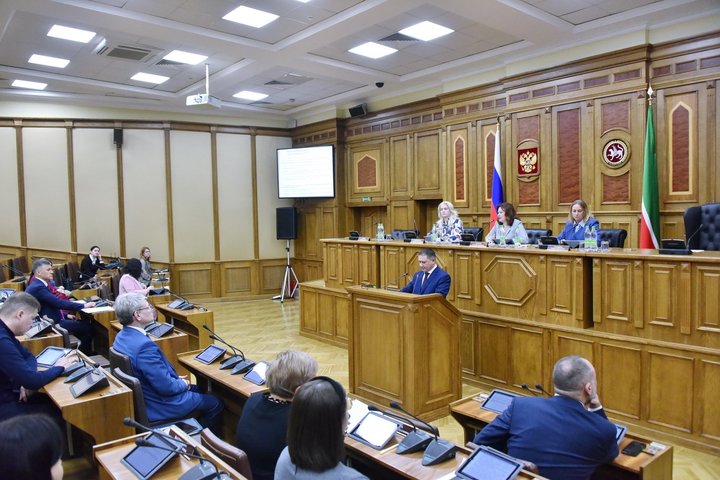Halfway to Soviet Medical-Labour Centers: Tatarstan legislators want to revive compulsory treatment of alcoholics
State Council discussed the problems of combating alcoholism, the modest opportunities of the republic to encourage coaches of future Olympians and highlighted the insufficient presence of small businesses in the real sector of the economy
Deputies of the State Council of Tatarstan want to legalise compulsory treatment of alcoholics. This legislative initiative, the problems of children's sports and the efficiency of the use of labor resources in the republic were discussed at a meeting of the Committee on Social Policy on 11 April. Read the details in the material of Realnoe Vremya.
“The decrease in primary morbidity rates confirms the fact of transition to a chronic form”
The report on the provision of narcological care in Tatarstan by the chief physician of the Republican Clinical Narcological Dispensary, Renat Utkelbaev, which was made at the meeting of the Committee of the State Council of the Republic of Tatarstan on Social Policy, revealed a serious problem — the insufficient effectiveness of rehabilitation of patients at the dispensary.
“Last year, the narcological service of the republic registered more than 57 thousand cases of narcological disorders, while the number of first-time registered cases decreased by 4.6 percent compared to 2022," Utkelbayev stated. “In the structure of morbidity, as before, alcohol-related disorders occupy a large part — 64 percent… The proportion of patients who successfully completed inpatient medical rehabilitation programmes increased to 92 percent in 2023, which is by 3.6 percent higher than in the regions of the Volga Federal District and by 7.1 percent more than in Russia as a whole.”
In 2023, 1,159 people were included in inpatient rehabilitation programmes, for the implementation of which the republic has 119 beds (in 2021 — 1,361, in 2022 — 1,314). About 92% of hospital patients successfully complete rehabilitation every year. Utkelbayev stressed that the final stage of rehabilitation of drug addicts and alcoholics is social rehabilitation and labour adaptation, but in this area, the achievements turned out to be modest: in 6 years, only 202 people were employed.
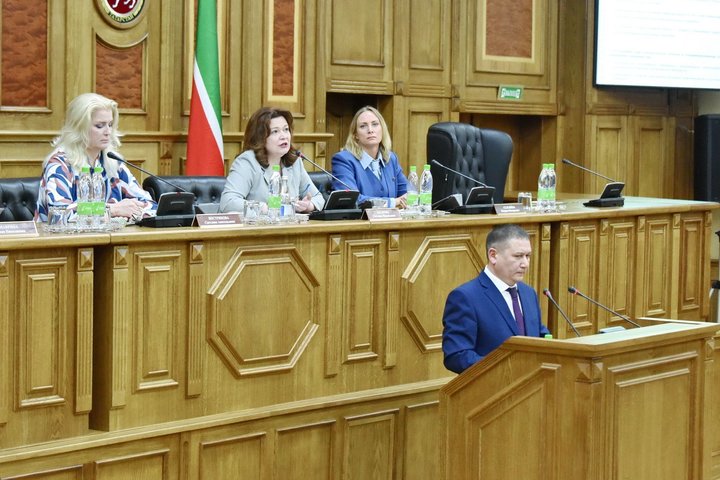
In 2023, 16,828 drug samples were tested in the toxicological laboratories of the republic (by 3% more than in 2022), and 4,730 of them turned out to be positive (11% more than in 2022). There were also 3,268 tests on ethanol (alcohol) compared to 3,064 in 2022, and the increase in positive results is 3%.
“By the results of the year, the primary incidence of all drug-related disorders has decreased by 4.6 percent in the republic," said Renat Utkelbayev. “In the structure of morbidity, as in previous years, alcohol-related disorders occupy a large part — 64 percent. In general, despite the measures taken, the problem of alcoholism and drug addiction continues to be relevant. The decrease in all indicators of primary morbidity associated with alcohol and drug use is not evidence of well-being in the republic — it only confirms the fact of transition to a chronic form.”
An indirect confirmation of the correctness of this judgment is another figure given by him: the incidence of alcoholic psychosis increased by 9% in 2023 compared to the previous year.
Is it time to force treatment?
The situation is complicated by that if a citizen is suspected of alcohol or drug intoxication, they cannot be forced to confirm or refute this suspicion through test. And it is impossible to force them to be treated for alcoholism or drug addiction if they do not want to — even if their disease harms not only themselves, but also others — family and children.
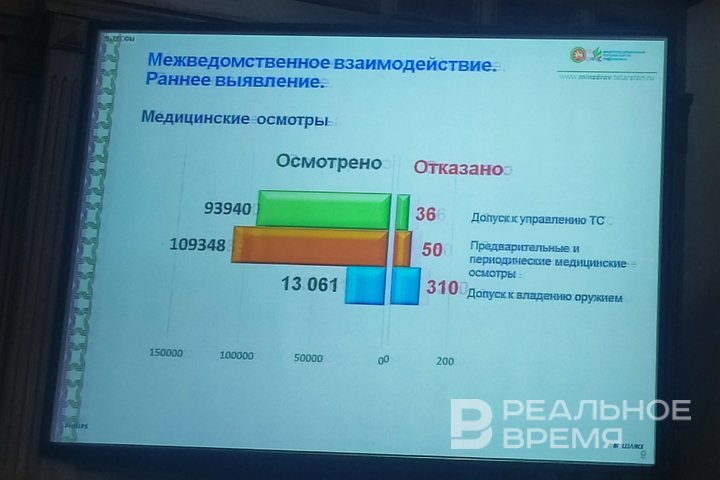
Therefore, Tatarstan parliamentarians are preparing a legislative initiative, which they hope to present in the State Duma already at the July session. They intend to propose amendments to the legislation, which provide for the possibility to oblige the court to compulsory testing, and in the case of diagnosis of alcohol addiction — to mandatory treatment and rehabilitation of citizens who have not previously been on dispensary supervision, but who evade treatment at the request of relatives or district police officers, as well as citizens who have committed administrative offenses, including including those related to driving under the influence of alcohol, and citizens who are in the process of terminating parental rights due to alcohol abuse. Besides, it is proposed to introduce compulsory treatment in specialised institutions for citizens who are under dispensary supervision, but continue to abuse alcohol and evade treatment, as well as those who have committed two or more administrative offenses under the influence of alcohol during the year.
“We have already started work on changing the legislation since last year," said Svetlana Zakharova, the chairperson of the Committee on Social Policy. “It is necessary to give an opportunity to families in which there are citizens suffering from alcohol to undergo a course of their treatment in a clinic, especially since there are very good results.”
Tatarstan legislators plan to consider and send proposals for preliminary consideration to the Duma to resolve the issue of the possibility of imposing an administrative punishment by the court with the obligation on the offender to undergo diagnosis, treatment for alcoholism, medical and social rehabilitation in the very near future
“So far, the feds do not really want to force or prohibit anything, but it is probably necessary," Svetlana Zakharova summed up. “Of course, it is desirable to employ [alcohol addicts], as in Soviet times, but we are not talking about this yet.”
There is not enough allowance for everyone
During the discussion of the issues on the agenda, Deputy Chairperson of the Committee on Social Policy Svetlana Vostrikova recalled that Russian President Vladimir Putin called for special attention to be paid to the sports reserve — children who will compete at the Olympic Games in Los Angeles in a few years, and those who prepare them for sporting victories do not receive special support from the state:
“According to your data, 93,751 people — our sports reserve — are trained by 3,146 coaches. What measures do you plan to take to ensure that our children are provided with high-quality sports training? We adopted the federal standard in 2014, ten years have passed. And at the moment, as far as I know, our schools are not provided with the federal standard of sports training. And only 72 coaches, according to your data, receive additional payments for the training of athletes. That is, three thousand train and only 72 of them receive additional payments for quality. The question is: do the other coaches get paid for anything or do they get only the “base”?"
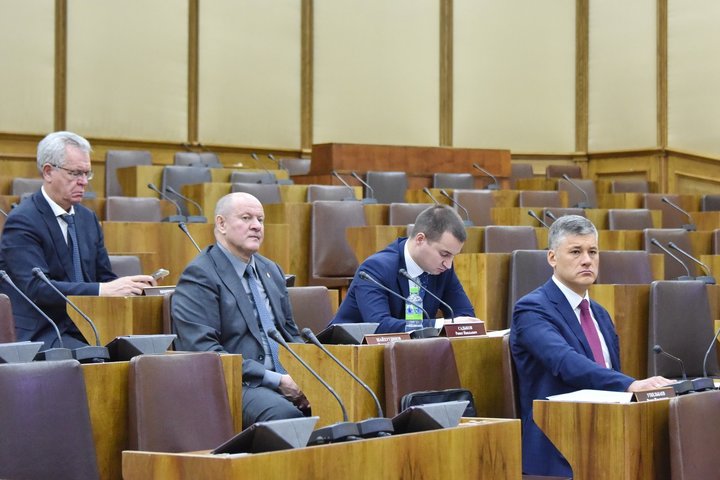
“We have 163 sports schools in the republic," said the first deputy minister of sports of the republic, Khalil Shaykhutdinov. “Almost 100 thousand students. We have adopted a roadmap and all the points are indicated, including the provision of sports equipment. Now we are considering the issue of bringing additional payments to the coaches to the federal level. We cannot pay additional payments for the results of the wards to all coaches. But other coaches receive a surcharge to bring them up to the average at the federal level. Today, the average salary for coaches is 60 thousand rubles.
Shaikhutdinov explained that coaches in Tatarstan receive an additional payment for the results of pupils only on condition that they win prizes at federal and international competitions. And that in recent years, 153 sports facilities have been transferred to sports schools in order for children to play sports “in modern conditions.”
It remains to add to this that in the past and in 2020-2022, the parents of young swimmers, for example, complained to Realnoe Vremya that they were charged an unaffordable fee for renting “other people's” pools during the repair of “native” and at sports camps that were held off'premise. Time will tell how this issue will be resolved in 2024.

However, the modesty of supporting young sports talents in the republic pales against the background of the “awards” distributed at the recent Volga Region Swimming Championship, where the winners were given ... discount coupons to the online store of swimming products as a prize. And even with a limited validity period of 1 month.
Efficient communication and inefficient agriculture
Reporting on the work of the government of the republic, Deputy Minister of Economy Oleg Pelevin gave interesting figures. In particular, describing the achievements in the development of small businesses, the popularisation of which the regional government considers an urgent task, he noted that “only 30 percent of small enterprises operate in the real sector of the economy," that is, in industries that produce tangible goods and provide services, with the exception of financial ones. At the same time, there is an increase in bankruptcies among individual entrepreneurs in the republic. In 2020-2022, 25-28 such bankruptcies were registered, and in 2023 — 51.
“In conditions of personnel shortage, the main factor in ensuring the sustainable development of the economy is to increase the efficiency of the use of labour resources," said Pelevin. “To assess the effectiveness of the use of labour resources, a comparative analysis of the subjects of Russia was carried out. In general, the efficiency of one employee in the republic exceeds the national average. However, the efficiency of labour use in certain sectors of the economy in Tatarstan, as it turned out, is lame. For example, in the production of food products, the output per 1 employed person in the Russian Federation on average in monetary terms is 5.015 thousand rubles, and in the Republic of Tatarstan — 4.414 thousand; in the production of textiles — 2.958 thousand rubles per 1 employed person in the Russian Federation and only 1.303 thousand in the Republic of Tatarstan, in the production of leather and leather products — 1.245 thousand and 0.8 thousand, respectively, and in the production of clothing — 1.038 and 0.436 thousand.”
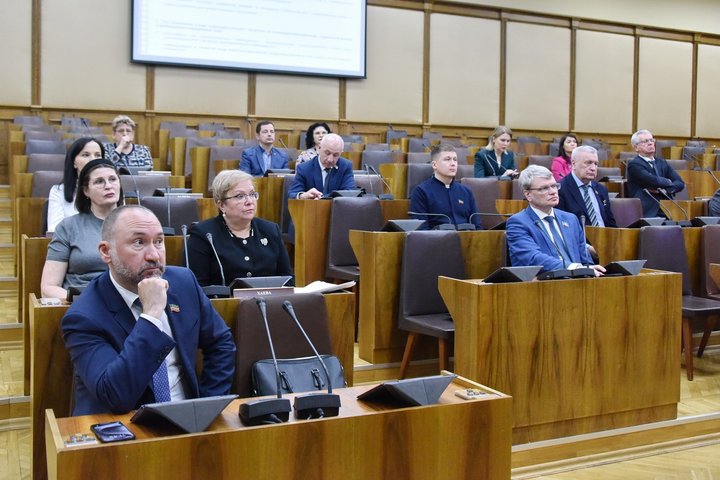
At the same time, such types of business activities as transportation and storage remain the most profitable (profitability growth of 179.3% compared to 2022), information and communication (169.2%), trade (159.4%), as well as construction (158.2%). But in the republic's manufacturing industries in 2023, the profit growth rate turned out to be “negative” — it reached only 92.3% of the previous year's level. But the situation in agriculture looks the worst — the profit in 2023 amounted to only 69.7% of the profit in 2022.
